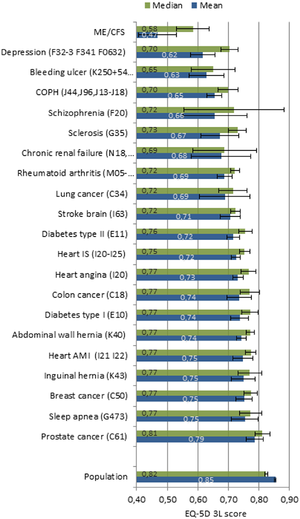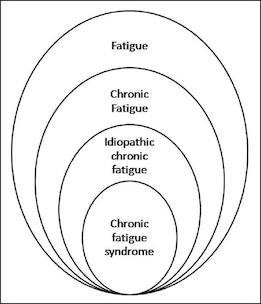Chronic fatigue syndrome



Chronic fatigue syndrome (CFS) was a name coined by the Centers for Disease Control (CDC) in response to an outbreak of "chronic flu-like illness" in Incline Village, Lake Tahoe in 1984-1985[2] and several outbreaks and sporadic cases in the United States during the 1980s.
Prior to Incline Village, chronic fatigue syndrome was known as myalgic encephalomyelitis (ME). The "chronic fatigue syndrome" outbreaks of the 1980s and 1990s were likely ME outbreaks, although they differed in some respects from the 1930s-1960s outbreaks. With the development of the CDC's 1988 Holmes criteria,[3] the UK's 1991 Oxford criteria, and the CDC's 1994 Fukuda criteria for CFS,[4] which differed in significant respects from historic descriptions of ME,[5] CFS became a broader diagnosis applied to a far large number of patients,[6][7] which some clinicians and patients regarded as a "wastebasket diagnosis" that included ME along with those suffering from a wide range of undefined or misdiagnosed fatiguing illnesses.[5][8][9][10][11]
There have been media reports of athletes diagnosed with ME or CFS who have recovered in a relatively short period of time after rest, supplementation, and diet changes,[12][13][14] but may have had overtraining syndrome rather than CFS[15][16][17][18][19] and a number of elite athletes have been forced to retire in their 20s or early 30s due to CFS.[20][21][22][23]
Although a diagnosis of CFS is valid and in the US the Fukuda criteria may be used, newer diagnostic criterion such as SEID (ME/CFS), the Canadian Consensus Criteria (ME/CFS), and International Consensus Criteria (ME) offer a more accurate diagnosis of ME/CFS and ME.[24]
Name controversy
The name "chronic fatigue syndrome" is controversial, as many consider it stigmatizing and focusing on a single symptom, chronic fatigue (CF), and despite the fact that post-exertional malaise is regarded as the hallmark symptom rather than chronic fatigue. For decades, patient advocates have been lobbying the CDC to instead use the name myalgic encephalomyelitis (ME).[25] Most patients and patient organizations prefer the name ME, or the hybrid ME/CFS. The names are often used interchangeably or together (ME/CFS).[26]
- June 2014, Dr. Nancy Klimas discusses the name controversy in the video ME/CFS Diagnosis and Name.[27]
- February 2016, Dr Anthony Komaroff, who was part of the CDC group of clinicians who coined the name chronic fatigue syndrome, said: "I think that was a big mistake because the name, in my opinion, and the opinion of a lot of people, it both trivializes and stigmatizes the illness. It makes it seem unimportant, maybe not even real".[28]
- December 2016, Unger et al. CDC Grand Rounds: Chronic Fatigue Syndrome - Advancing Research and Clinical Education[29]. abstract notes:
Chronic fatigue syndrome (CFS) is a complex and serious illness that is often misunderstood. Experts have noted that the terminology "chronic fatigue syndrome" can trivialize this illness and stigmatize persons who experience its symptoms (1). The name was coined by a group of clinicians convened by CDC in the late 1980s to develop a research case definition for the illness, which, at the time, was called chronic Epstein-Barr virus syndrome. The name CFS was suggested because of the characteristic persistent fatigue experienced by all those affected and the evidence that acute or reactivated Epstein-Barr virus infection was not associated with many cases (2). However, the fatigue in this illness is striking and quite distinct from the common fatigue everyone experiences. A variety of other names have been used, including myalgic encephalomyelitis (ME), ME/CFS, chronic fatigue immune dysfunction, and most recently, systemic exertion intolerance disease (3). The lack of agreement about nomenclature need not be an impediment for advancing critically needed research and education. The term ME/CFS will be used in this article.[29]
- Jul 2017, the CDC changed its website for Chronic Fatigue Syndrome to Myalgic Encephalomyelitis/Chronic Fatigue Syndrome (ME/CFS).[26]
The Oxford criteria and Fukuda criteria are used in Australia, South Africa, Canada, and parts of Europe; they use the name CFS. The UK will sometimes use the name chronic fatigue syndrome, CFS/ME, or more recently ME/CFS although they retired the Oxford criteria in late 2021.[30] The United States CDC now uses the acronym ME/CFS.[26]
Disability

Unadjusted average quality of life in CFS compared to different illnesses. Source: PLoS One. 2015; 10(7): e0132421.
Chronic fatigue syndrome is a highly disabling illness, with only around 5% of patients achieving a full recovery. Quality of life, physical and work limitations, and pain are consistently found to be worse in CFS patients than in other chronic illnesses.[31]
Notable studies
- 2014, Chronic fatigue syndrome: A review[32] (Full Text)

See also
- Misdiagnosis of myalgic encephalomyelitis and chronic fatigue syndrome
- Chronic fatigue
- Fatigue
- Idiopathic chronic fatigue
- List of myalgic encephalomyelitis and chronic fatigue syndrome outbreaks
- ME/CFS
- Myalgic encephalomyelitis
- Pediatric myalgic encephalomyelitis and chronic fatigue syndrome
- Prognosis for myalgic encephalomyelitis and chronic fatigue syndrome
- Severe and very severe ME
- Systemic Exertion Intolerance Disease
Generally accepted criteria for diagnosing ME/CFS and ME
- CDC Myalgic Encephalomyelitis/Chronic Fatigue Syndrome 2017 diagnostic criteria[33] (Alternatively known as the SEID) criteria (Institute of Medicine, 2015)[34] ME/CFS (SEID) is accurately diagnosed when the core symptoms are met. The Institute of Medicine report as a whole is a comprehensive review of the medical literature available at time of publication (2015). Adults can be diagnosed at 6 months while pediatric cases are diagnosed at three months.
- International Consensus Criteria (ICC)[35] This criterion will accurately diagnose myalgic encephalomyelitis (ME). There is no requirement that the individual have symptoms for a specified period of time for diagnosis, as opposed to CCC, Fukuda, and SEID, which all require 6 months in adults.
- Canadian Consensus Criteria (CCC)[36] A diagnosis of moderate and severe forms of ME/CFS are accurately made using this criterion. Adults can be diagnosed at 6 months while pediatric cases are diagnosed at three months.
Learn more
- Chronic Fatigue Syndrome[37] - SBS News
- 2019, Brain studies show chronic fatigue syndrome and Gulf War illness are distinct conditions[38]
References
- ↑ 1.0 1.1 Bateman, Lucinda; Bested, Alison C.; Bonilla, Hector F.; Chheda, Bela V.; Chu, Lily; Curtin, Jennifer M.; Dempsey, Tania T.; Dimmock, Mary E.; Dowell, Theresa G. (November 1, 2021). "Myalgic Encephalomyelitis/Chronic Fatigue Syndrome: Essentials of Diagnosis and Management". Mayo Clinic Proceedings. 96 (11): 2861–2878. doi:10.1016/j.mayocp.2021.07.004. ISSN 0025-6196. PMID 34454716.
- ↑ Boffey, Philip M. (1987). "Fatigue 'Virus' Has Experts More Baffled And Skeptical Than Ever". Retrieved August 11, 2018.
- ↑ Holmes, G. P.; Kaplan, J.E.; Gantz, N.M.; Komaroff, A. L.; Schonberger, L. B.; Straus, S.E.; Jones, J.F.; Dubois, R.E.; Cunningham-Rundles, C. (March 1988). "Chronic fatigue syndrome: a working case definition". Annals of Internal Medicine. 108 (3): 387–389. doi:10.7326/0003-4819-108-3-387. ISSN 0003-4819. PMID 2829679.
- ↑ Fukuda, K.; Straus, S.E.; Hickie, I.; Sharpe, M. C.; Dobbins, J. G.; Komaroff, A. (December 15, 1994). "The chronic fatigue syndrome: a comprehensive approach to its definition and study. International Chronic Fatigue Syndrome Study Group" (PDF). Annals of Internal Medicine. American College of Physicians. 121 (12): 953–959. ISSN 0003-4819. PMID 7978722.
- ↑ 5.0 5.1 Hyde, Byron (2016). The Nightingale Research Foundation Definition of Myalgic Encephalomyelitis (M.E.) (PDF). IACFS/ME. pp. 1–2. Retrieved January 31, 2020.
- ↑ Jason, Leonard A.; Sunnquist, Madison; Brown, Abigail; Evans, Meredyth; Vernon, Suzanne D.; Furst, Jacob D.; Simonis, Valerie (2014). "Examining case definition criteria for chronic fatigue syndrome and myalgic encephalomyelitis". Fatigue: Biomedicine, Health & Behavior. 2 (1): 40–56. doi:10.1080/21641846.2013.862993.
- ↑ Sunnquist, Madison; Jason, Leonard; Nehrke, Pamela; Goudsmit, Ellen (2017). "A Comparison of Case Definitions for Myalgic Encephalomyelitis and Chronic Fatigue Syndrome" (PDF). Journal of Chronic Diseases and Management. 2 (2): 1013. PMC 5663312. PMID 29104961.
- ↑ Bassett, Jodi (March 2009). "The misdiagnosis of 'CFS' - Summary" (PDF).
- ↑ Crowhurst, Greg (May 10, 2015). Severe ME: Notes for Carers. Lulu. ISBN 978-1-326-27186-2.
- ↑ Rehmeyer, Julie (May 23, 2017). Through the Shadowlands: A Science Writer's Odyssey into an Illness Science Doesn't Understand. Harmony/Rodale. ISBN 978-1-62336-766-4.
- ↑ Summers, Edie (February 26, 2016). The Memory of Health. Lulu.com. ISBN 978-0-9972738-0-9.
- ↑ "Runner housebound after developing ME says diet gave him life back". inews.co.uk. July 13, 2018. Retrieved December 18, 2021.
- ↑ Broadbent, Rick. "Muslim fighter with ME who left an arranged marriage to win world title". The Times. ISSN 0140-0460. Retrieved December 18, 2021.
- ↑ Park, Andy; O'Halloran, Clare. "Committee reviews 'potentially harmful and old fashioned' chronic fatigue treatments". ABC News. 6mins 18s.
- ↑ Spence, Vance. "Snippets | A presentation by MERGE Chairman Dr Vance Spence on 12 November 2005 at the Oak Tree Court Conference Centre, Coventry, at the invitation of the Warwickshire Network for ME". Irish M.E. Association.
- ↑ Nacul, Luis; Lacerda, Eliana M; Kingdon, Caroline C; Curran, Hayley; Bowman, Erinna W (March 1, 2017). "How have selection bias and disease misclassification undermined the validity of myalgic encephalomyelitis/chronic fatigue syndrome studies?". Journal of Health Psychology: 1359105317695803. doi:10.1177/1359105317695803. ISSN 1359-1053. PMC 5581258. PMID 28810428.
- ↑ Devasahayam, Anoop; Lawn, Tara; Murphy, Maurice; White, Peter D (January 2012). "Alternative Diagnoses to Chronic Fatigue Syndrome in Referrals to a Specialist Service: Service Evaluation Survey". JRSM Short Reports. 3 (1): 1–5. doi:10.1258/shorts.2011.011127. ISSN 2042-5333. PMC 3269106. PMID 22299071.
Half of all the referred patients to a specialist CFS clinic had alternative medical and psychiatric diagnoses.
- ↑ Lambert, M.I.; Derman, W.E. (January 1, 2000). "The differential diagnosis and clinical approach to the athlete with chronic fatigue" (PDF). International SportMed Journal. 1 (3). ISSN 1528-3356.
- ↑ Baraniuk, James N. (October 2, 2017). "Chronic fatigue syndrome prevalence is grossly overestimated using Oxford criteria compared to Centers for Disease Control (Fukuda) criteria in a U.S. population study". Fatigue: Biomedicine, Health & Behavior. 5 (4): 215–230. doi:10.1080/21641846.2017.1353578. ISSN 2164-1846. PMC 6407870. PMID 30854252.
- ↑ Murley, Sam (April 10, 2019). "Illness robbed Marshall of crowning glory". Royal Gazette.
- ↑ "Mansdorf calls it quits". The Jerusalem Post. November 1994. Archived from the original on 2016.
- ↑ "Benefizspiel für den schwer kranken Olaf Bodden". Die Welt (in Deutsch). 2021. Retrieved November 17, 2021.
- ↑ "Michelle Akers USA". FIFA. Archived from the original on June 10, 2015.
- ↑ Smith ME, Nelson HD, Haney E, Pappas M, Daeges M, Wasson N, McDonagh M (December 2014). "Diagnosis and Treatment of Myalgic Encephalomyelitis/Chronic Fatigue Syndrome No. 219". Evidence Report/Technology Assessment. Agency for Healthcare Research and Quality (US): 1–433. doi:10.23970/AHRQEPCERTA219. PMID 30313001.
- ↑ "A Disease in Search of a Name: The History of CFS and the Efforts to Change Its Name - Prohealth". Prohealth. January 3, 2007. Retrieved August 11, 2018.
- ↑ 26.0 26.1 26.2 "Myalgic Encephalomyelitis/Chronic Fatigue Syndrome (ME/CFS)". Centers for Disease Control and Prevention. July 3, 2017. Retrieved August 11, 2018.
- ↑ Klimas, Nancy (June 21, 2014). "ME/CFS Diagnosis and Name with Dr. Nancy Klimas". YouTube. ME/CFS Community.
- ↑ Komaroff, Anthony; Iskander, John (February 17, 2016), "Interview with Dr Anthony Komaroff", CDC Public Health Ground Rounds - Beyond the Data - Chronic Fatigue Syndrome: Advancing Research and Clinical Education
- ↑ 29.0 29.1 Unger, Elizabeth R.; Lin, Jin-Mann Sally; Brimmer, Dana J.; Lapp, Charles W.; Komaroff, Anthony L.; Nath, Avindra; Laird, Susan; Iskander, John (December 30, 2016). "CDC Grand Rounds: Chronic Fatigue Syndrome - Advancing Research and Clinical Education". MMWR. Morbidity and mortality weekly report. 65 (50–51): 1434–1438. doi:10.15585/mmwr.mm655051a4. ISSN 1545-861X. PMID 28033311.
- ↑ NICE Guideline Development Group (October 29, 2021). "Myalgic Encephalomyelitis (or Encephalopathy)/Chronic Fatigue Syndrome:diagnosis and management. NICE guideline". National Institute for Health and Care Excellence.
- ↑ Hvidberg, Michael Falk; Brinth, Louise Schouborg; Olesen, Anne V.; Petersen, Karin D.; Ehlers, Lars (July 6, 2015). "The Health-Related Quality of Life for Patients with Myalgic Encephalomyelitis / Chronic Fatigue Syndrome (ME/CFS)". PLOS ONE. 10 (7): e0132421. doi:10.1371/journal.pone.0132421. ISSN 1932-6203. PMC 4492975. PMID 26147503.
- ↑ 32.0 32.1 Singh, Shubh Mohan; Sarkar, Siddharth; Rao, Pradyumna; Balachander, Srinivas (July 1, 2014). "Chronic fatigue syndrome: A review". Medical Journal of Dr D.Y. Patil University. 7 (4): 415. doi:10.4103/0975-2870.135252. ISSN 0975-2870.
- ↑ "Symptoms | Myalgic Encephalomyelitis/Chronic Fatigue Syndrome". Centers for Disease Control and Prevention. January 27, 2021. Retrieved February 25, 2021.
- ↑ Clayton, Ellen Wright; Alegria, Margarita; Bateman, Lucinda; Chu, Lily; Cleeland, Charles; Davis, Ronald; Diamond, Betty; Ganiats, Theodore; Keller, Betsy; Klimas, Nancy; Lerner, A Martin; Mulrow, Cynthia; Natelson, Benjamin; Rowe, Peter; Shelanski, Michael (2015). "Beyond Myalgic Encephalomyelitis/Chronic Fatigue Syndrome - Redefining an Illness" (PDF). National Academies.
- ↑ Carruthers, Bruce M.; van de Sande, Marjorie I.; De Meirleir, Kenny L.; Klimas, Nancy G.; Broderick, Gordon; Mitchell, Terry; Staines, Donald; Powles, A.C. Peter; Speight, Nigel; Vallings, Rosamund; Bateman, Lucinda; Baumgarten-Austrheim, Barbara; Bell, David; Carlo-Stella, Nicoletta; Chia, John; Darragh, Austin; Jo, Daehyun; Lewis, Donald; Light, Alan; Marshall-Gradisnik, Sonya; Mena, Ismael; Mikovits, Judy; Miwa, Kunihisa; Murovska, Modra; Pall, Martin; Stevens, Staci (August 22, 2011). "Myalgic encephalomyelitis: International Consensus Criteria". Journal of Internal Medicine. 270 (4): 327–338. doi:10.1111/j.1365-2796.2011.02428.x. ISSN 0954-6820. PMC 3427890. PMID 21777306.
- ↑ Carruthers, Bruce M.; Jain, Anil Kumar; De Meirleir, Kenny L.; Peterson, Daniel L.; Klimas, Nancy G.; Lerner, A. Martin; Bested, Alison C.; Flor-Henry, Pierre; Joshi, Pradip; Powles, AC Peter; Sherkey, Jeffrey A.; van de Sande, Marjorie I. (2003), "Myalgic Encephalomyelitis/Chronic Fatigue Syndrome: Clinical Working Case Definition, Diagnostic and Treatment Protocols" (PDF), Journal of Chronic Fatigue Syndrome, 11 (2): 7–115, doi:10.1300/J092v11n01_02
- ↑ Dambelli, Milena (October 16, 2018). "Chronic Fatigue Syndrome (1 hr. News Segment)". SBS Australia (Video). Retrieved October 17, 2018.
- ↑ "Brain studies show chronic fatigue syndrome and Gulf War illness are distinct conditions". medicalxpress.com. Retrieved December 13, 2019.

